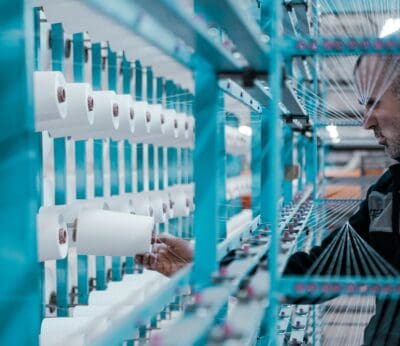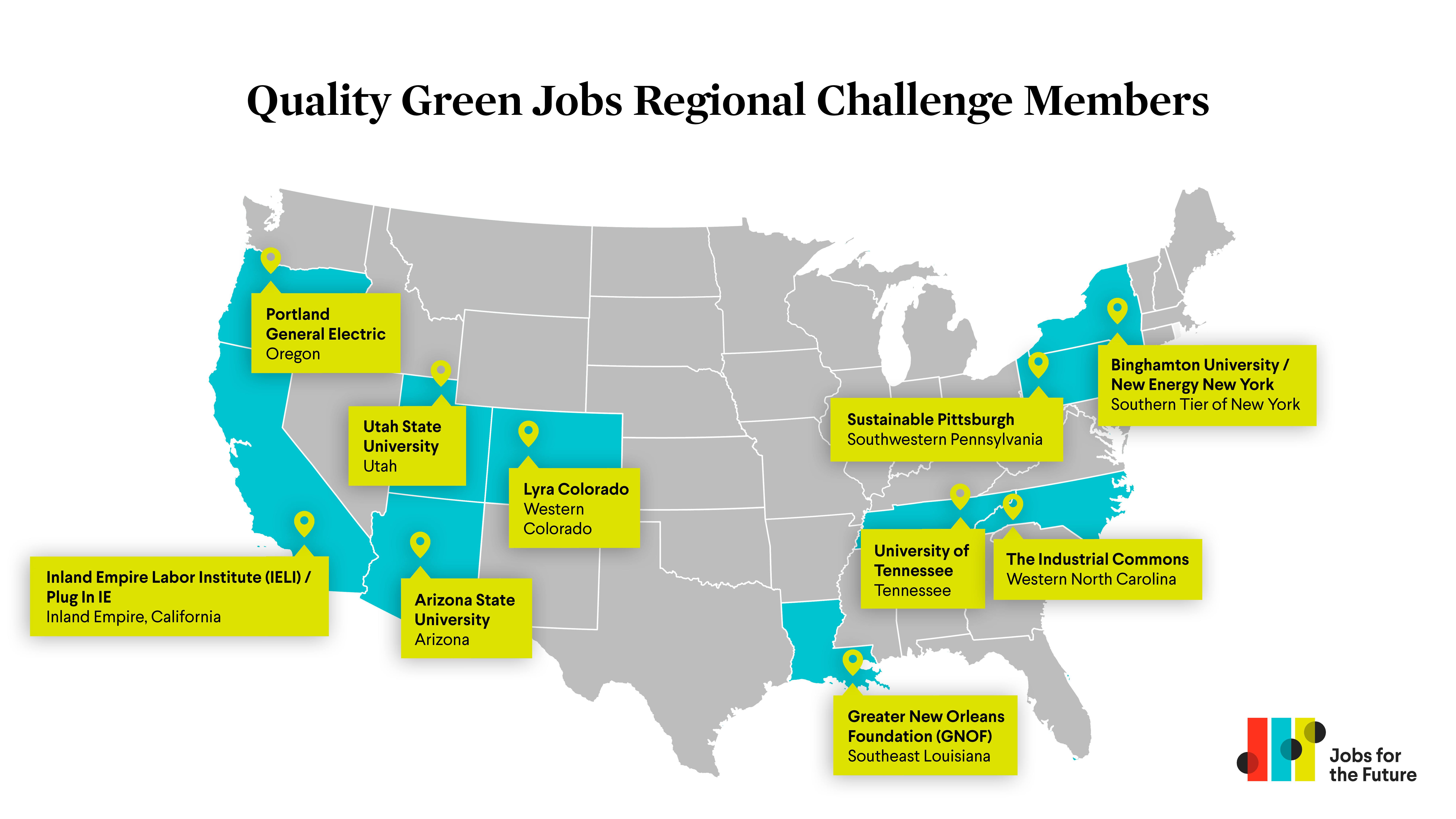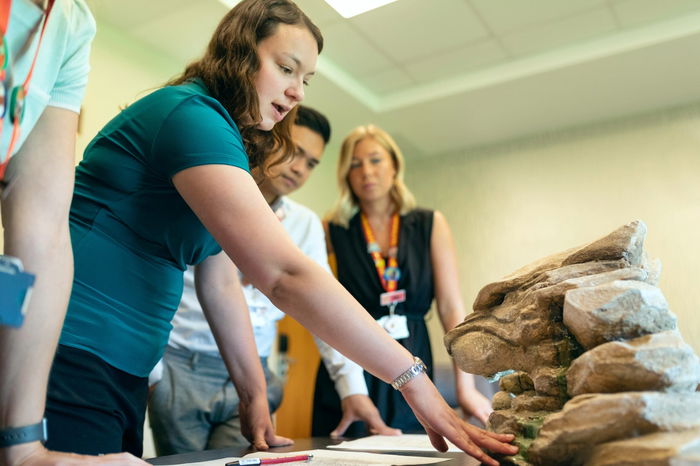
Five Insights From JFF’s Quality Green Jobs Regional Challenge
February 7, 2024
At a Glance
10 local partners advance in JFF’s regional challenge to develop training strategies for placing workers in quality green jobs
When Jobs for the Future (JFF) launched our Quality Green Jobs Regional Challenge last summer, we invested in a diverse, innovative group of 20 regions across the United States leading on-the-ground efforts to tackle climate-related workforce challenges. Today, we announce the 10 semifinalists that will advance in the Challenge.
JFF’s Quality Green Jobs Regional Challenge comprises three iterative phases: 1) learning, 2) planning, and 3) implementation. For Phase 1 of the challenge, 20 regions formed a national learning community, facilitated by JFF, to deepen our collective understanding of regional needs, risks, and opportunities at the intersection of climate and workforce development. Five key insights from the field emerged.
-
Building informed strategies with employer partners is key to ensuring green jobs are quality jobs and a pipeline of workers is prepared for those jobs.
In forthcoming survey data from JFF, 85% of employers say businesses play a role in protecting the environment. A similar proportion of employers (86%) think regional-level efforts are at least “somewhat important” to promoting green job growth in this country.
The elephant in the room is that employers hold the key. We need to get them on board before making promises to workers.
Challenge Member
The catch is that 37% of employers say lack of funding for implementing green job practices is a barrier to creating green jobs in their region. Sixty percent say businesses need more resources and funding to improve workers’ skills, and almost half say they need greater incentives from the government to support investments in green jobs.
-
Early access and exposure to green skills and career pathways in K-12 are critical to disrupt occupational segregation and prepare individuals for quality green jobs now and in the future.
Demonstrating viable careers creates curiosity and interest. Connecting youth to career and technical education, dual enrollment, and work-based learning and the baseline, transferable skills learned in and out of the classroom demonstrate the diversity of jobs in the green sector.
School districts with higher enrollments of Black, Latine, and Indigenous students receive less funding than districts with fewer students of color. Black youth are also less likely to participate in experiences that promote achievement in STEM. Early exposure to green skills and career pathways is essential to disrupting occupational segregation in the green economy. Additionally, educators, training providers, and community-based organizations can do more to increase access to social capital for Black, Latine, and Indigenous workers and learners. How can your organization or network of partners connect them to leaders in the green economy? An important reminder:
Workers don’t just show up in the workforce. Early access and exposure to green jobs matters.
Challenge Member
As stakeholders committed to increasing access to quality green jobs for populations facing systemic barriers, we must be intentional about early access and exposure.
-
Retention for populations facing systemic barriers to quality jobs requires an investment in the trifecta: hard skills, soft skills, and wraparound services.
Consider building a retention plan for workers: Build in milestones and incentives at common recidivism points, maintain coaching and checkpoints following job placements, and work with employers to develop robust onboarding programs, including peer support.
If we want to increase diversity in the green sector, wraparound services need to be treated as a core component of green training programs.
Challenge Member
According to Molly Bauch of Accenture, “Hard skills get you the job, soft skills keep the job.” JFF CEO Maria Flynn wrote for Forbes about the increased importance of “inherently human,” or employability, skills amidst the rapid infusion of artificial intelligence across industries.
-
Finding language that resonates across divides is a successful strategy for creating synergy among stakeholders engaged in climate-related workforce development efforts in your region.
A just transition to a greener economy will require that all U.S. regions, regardless of political ideology, prepare workers and learners with essential green skills. Regions must identify a mantra stemming from shared cultural values or agreements that resonate with regional policymakers, employers, and other stakeholders to help overcome differences and barriers to engagement.
We do progressive work in a red space. So, we focus on what we can all agree on: that we will always do what’s best for our community. Focusing on a shared value helps us get around the politics and build allyship.
Challenge Member
Most of our Challenge Members find quality-centric framing (good pay, benefits, transferrable skills, growth, culture, and structure) and community-centric framing (jobs that help families thrive) are more successful than climate/green framing. For example, “We will always do what’s best for the community” emphasizes a shared value over the work itself.
- Much of the U.S. depends on water, energy, food, recreation, and forests from rural areas, according to the U.S. Global Change Research Program. Regions must work with rural communities to prepare workers and learners for the growing green economy.
Engaging with rural communities presents unique challenges and opportunities that require asset-based, considerate approaches and a deep commitment to fostering trust and collaboration. Unfulfilled promises about forthcoming green jobs made over the past decade and a half harmed many rural communities. It is essential to work closely with regional employers to facilitate training opportunities based on the most in-demand green skills.
In our community, we’re starting from a trust deficit. This time around, we really need to do what we say we’re going to do.
Challenge Member
To earn trust and meet the growing demand for rural workers with green skills, it is essential to identify social leaders who garner the respect of the community of workers you seek to engage. As you build outreach, training, and retention strategies, involve these leaders in planning committees and key staff positions to align solutions with the community’s needs.
Additionally, consider potential barriers to success and offer support and wraparound services—such as transportation, participation and training stipends, and translated materials—to address these barriers. Finally, recognize both the heterogeneity and strengths of rural communities. Not all rural communities are the same—understand the community’s unique assets and opportunities and design solutions and strategies grounded in its strengths.
As we transition to a greener economy, we cannot leave rural communities behind. A truly just transition requires rural communities, which produce much of our food, energy, and water, to be at the forefront of green skill integration.
These insights show there’s real promise and knowledge in leading regional efforts to develop quality green jobs. That’s why JFF is expanding our partnership with regional leaders that have demonstrated impact.
10 Members Advance in Regional Challenge
Today, JFF and the Ares Foundation are thrilled to announce the 10 regions that will advance to Phase 2 of the challenge and receive $75,000 planning grants. Collectively, these regions are positioned to train and place 25,000 individuals in quality green jobs by 2027.
JFF will continue engaging with all 20 Phase 1 grantees by sharing resources and facilitating connections to advance regional work.
In Phase 2, the 10 Challenge Members will develop regional Quality Green Jobs Agendas detailing their strategies for training individuals and placing them in quality green jobs. The Quality Green Jobs Regional Challenge celebrates the unique role of regions and regional leaders in fostering solutions at the intersection of climate and workforce development. The challenge will elevate successful, scalable regional strategies and models to accelerate a clean energy transition that drives equitable economic advancement for all.

When selecting Challenge Members to engage in Phase 2, we prioritized geographical, industry, and population diversity.
- 80% of Challenge Members serve rural and/or Indigenous communities
- 40% prioritize quality green job training and placement for young people who are not working or in school
- 40% design training and placement programs for people who have been incarcerated
- All the Challenge Members described regionally responsive, innovative solutions to address challenges at the intersection of climate and workforce
Meet the Challenge Members
Each Phase 2 Challenge Member is designing a regional strategy to expand green jobs that we believe communities across the U.S. can replicate. Learn more about their proposed models (which will be implemented in the location listed alongside the member name) below.
Arizona State University | Arizona
ASU will utilize virtual reality (VR) technology to provide training for populations who have faced barriers that limit opportunities in the labor market to prepare them for quality jobs aligned with Arizona’s specific climate challenges.
Inland Empire Labor Institute (IELI) / Plug In IE | California
IELI and Plug In IE will convene a regional partnership to foster equitable pathways to high-road climate mitigation and adaptation occupations through pre-apprenticeships, union apprenticeships, and holistic support services.
Lyra Colorado | Rural Western Colorado
Lyra Colorado plans to connect the talent development pipeline for quality green jobs to youth in rural Western Colorado, with a strong emphasis on work-based learning and career and technical education pathways.
Greater New Orleans Foundation (GNOF) | Southeast Louisiana
GNOF will catalyze a construction/green infrastructure sector partnership focused on the development of training pathways in the Black, Indigenous, and rural communities most impacted by climate threats and a model for training individuals who are incarcerated for quality green jobs upon reentry to the workforce.
Binghamton University / New Energy New York | Southern Tier of New York
Binghamton University, a State University of New York institution, leads the 16-member New Energy New York (NENY) coalition spanning the private and public sectors to build out a battery and energy storage hub in the region using extended reality (XR) technology to train workers—including those without high school diplomas—at scale.
The Industrial Commons | Western North Carolina
A leader in the U.S. textile circular economy, The Industrial Commons will scale and accelerate its vocational training programs, industry partnerships, and education provider partnerships nationally to reduce textile waste.
Portland General Electric on behalf of Oregon Clean Energy Workforce Coalition (OCEWC) | Oregon
OCEWC includes more than 60 organizations, comprising major employers, training providers, and local governments, that will launch a pilot program to build energy sector career awareness and job training and placement opportunities for underserved populations within construction, energy efficiency, and energy infrastructure.
Sustainable Pittsburgh | Southwestern Pennsylvania
Sustainable Pittsburgh will steward a just transition in a Rust Belt region where economic development has relied on extractive industries through a focus on work-based training models (Registered Apprenticeships and pre-apprenticeships and on-the-job, incumbent worker, and customized job training).
Utah State University | Utah
Land-grant university-led initiative to offer clean energy training at multiple levels of education—through statewide certificate programs, a bachelor’s degree program, and green skills integration throughout the university’s degree programs.
University of Tennessee | Tennessee
University-led initiative to steward a just transition in manufacturing and construction in a state with a coal-based energy economy.
JFF and the Ares Charitable Foundation are honored to support and champion Challenge Members and look forward to disseminating learning to the broader field. Please stay in touch and follow along as we continue to discover regional quality green job strategies that drive equitable economic advancement for all.
The Climate Innovation incubated practice at JFFLabs takes an inclusive approach to inform, educate, and improve the skills of individuals for climate-resilient jobs through innovation and collaboration across sectors, regions, new business models, and capital investments.
Climate-Resilient Employees for a Sustainable Tomorrow (CREST) is a career preparation and skill improvement initiative of the Ares Charitable Foundation that aims to close the gap between the demand for a skilled workforce for green jobs and the number of people prepared for these opportunities.
Related Content

JFFLabs Climate Innovation
Mobilizing partners toward a climate-resilient workforce. The climate crisis presents challenges and opportunities across society. Corporations are struggling to prepare their organizations and the jobs within them to withstand the shifting landscape; meanwhile, workers who…

Climate-Resilient Employees for a Sustainable Tomorrow (CREST)
To build an inclusive, resilient economy, more workers will need to be equipped with skills needed to navigate a growing green economy. As that world adapts to a changing climate, we are committed to accelerating…
